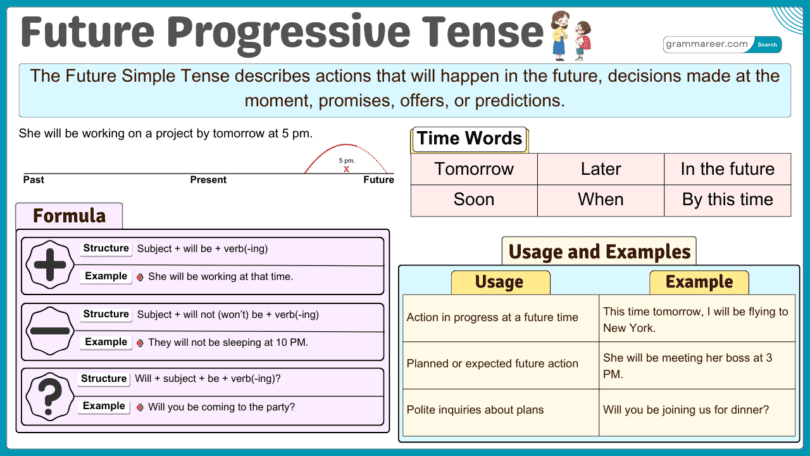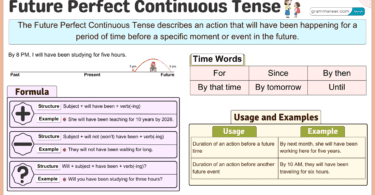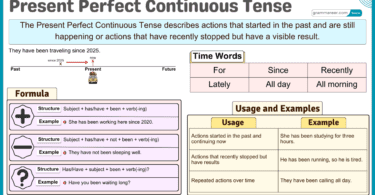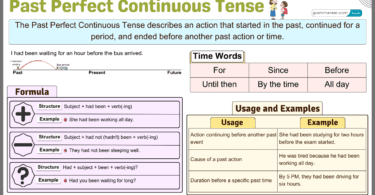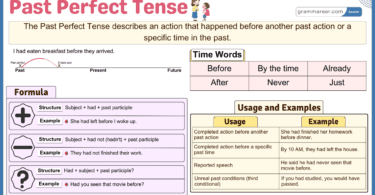The Future Continuous Tense describes actions that will be in progress at a specific time in the future. It is useful for talking about future events that will occur continuously over a period of time. Mastering its structure and usage enhances your ability to express future plans, ongoing actions, and expectations clearly, while strengthening your overall understanding of English grammar and tenses.
Table of Contents
Sentence Structures of the Future Continuous Tense
The Future Continuous Tense has three main structures: affirmative, negative, and interrogative sentences.
Affirmative Sentences
Structure: Subject + will be + Verb + -ing + Object
Examples:
- Aisha will be visiting Turkey next month.
- They will be playing football at 5 PM tomorrow.
In both examples, will be is used with all subjects, followed by the -ing form of the main verb.
Negative Sentences
Structure: Subject + will not be + Verb + -ing + Object
Examples:
- Bilal will not be watching TV tonight.
- We won’t be eating junk food anymore.
The contraction won’t be is commonly used instead of will not be.
Interrogative Sentences
Structure: Will + Subject + be + Verb + -ing + Object + ?
Examples:
- Will Hamza be studying for his exam?
- Will they be traveling to Europe next summer?
Double Interrogative Sentences
Structure: Question Word + will + Subject + be + Verb + -ing + Object + ?
Examples:
- What will Fatima be doing tomorrow?
- Where will they be going for their vacation?
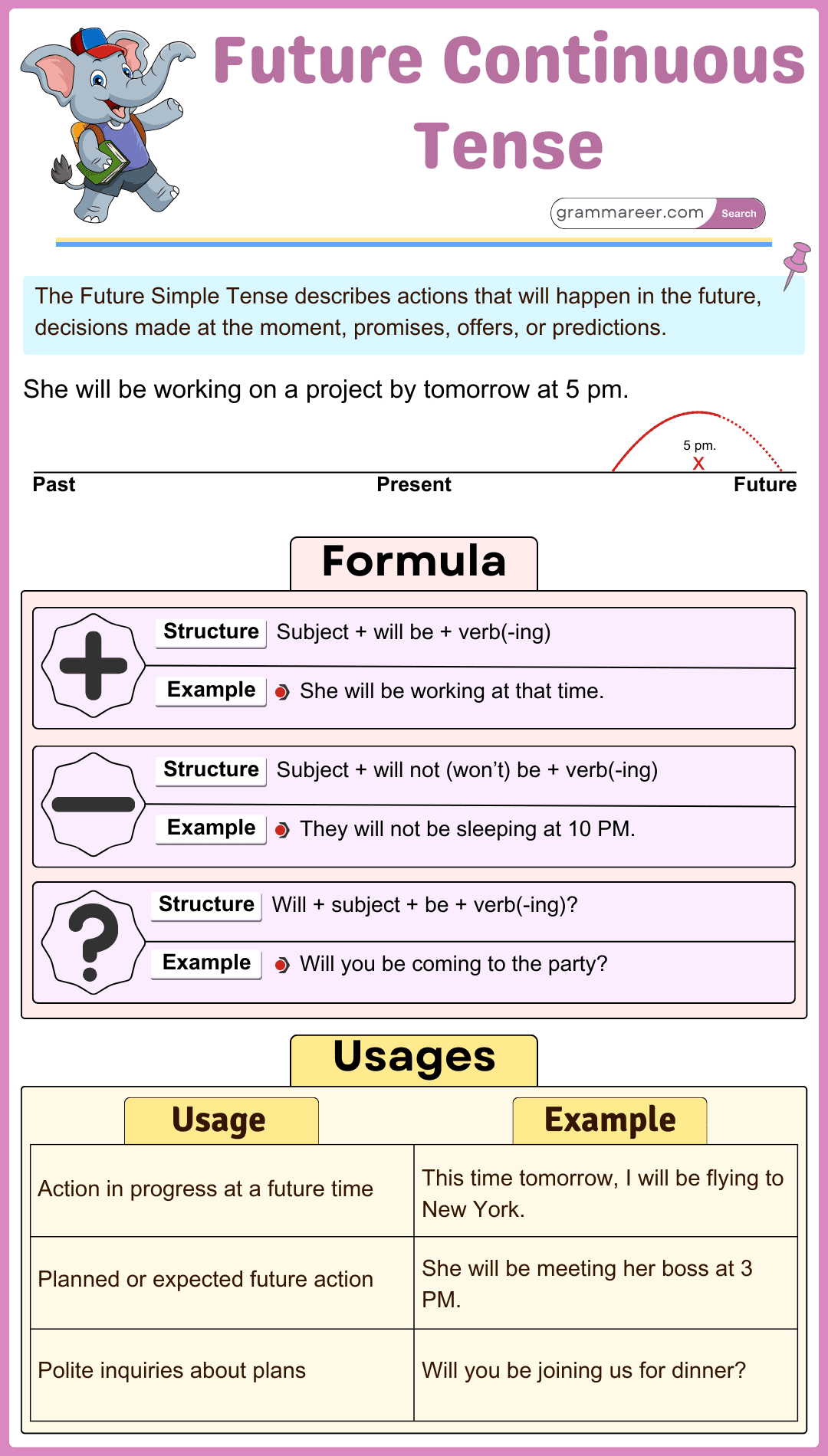
Subject-Verb Agreement in Future Continuous
In the Future Continuous Tense, will be is used with all subjects, both singular and plural.
| Subject | Helping Verb | Main Verb Example |
|---|---|---|
| I | will be | will be studying |
| You | will be | will be playing |
| He/She/It | will be | will be writing |
| We/They | will be | will be learning |
| The teacher | will be | will be explaining |
| My parents | will be | will be traveling |
Time Expressions in Future Continuous
Time expressions in the Future Continuous Tense help indicate when an action will be happening in the future. They provide clarity about the specific time or duration of an ongoing future event.
- At 5 PM: She will be attending a meeting at 5 PM.
- Tomorrow: They will be traveling tomorrow.
- Next week/month/year: I will be working on a project next week.
- In the evening: We will be having dinner in the evening.
- While: She will be sleeping while we are working.
Adverb Placement in Future Continuous
Adverbs like probably, definitely, surely, soon are placed between ‘will’ and ‘be’.
Examples:
- She will probably be attending the event.
- They will definitely be arriving soon.
Uses of the Future Continuous Tense
The Future Continuous Tense is used to describe actions that will be in progress at a specific time in the future. It is formed using will be + verb + ing.
1. Actions in Progress at a Specific Time in the Future
It describes actions that will be happening at a certain point in the future.
- This time tomorrow, I will be flying to Paris.
- At 8 PM tonight, they will be having dinner.
2. Actions That Will Happen as Part of a Routine or Plan
It is used to describe future events that are expected to happen regularly or as part of a schedule.
- She will be attending meetings all day tomorrow.
- The train will be leaving at 6 PM as usual.
3. Polite Inquiries About Someone’s Future Plans
It is often used to ask politely about someone’s plans or to know if they will be available.
- Will you be joining us for lunch tomorrow?
- Will she be using the car this evening?
4. Emphasizing the Duration of a Future Action
It highlights how long an action will continue in the future.
- By next month, I will be working on this project for a year.
- They will be traveling around Europe for the next two weeks.
Future Continuous Tense vs. Future Perfect Continuous Tense
The Future Continuous describes an action that will be in progress at a specific time in the future, while the Future Perfect Continuous shows an action that will have been ongoing for a period of time before a future event.
| Feature | Future Continuous Tense | Future Perfect Continuous Tense |
|---|---|---|
| Usage | Action that will be in progress at a future time. | Action that will have been ongoing before a future event. |
| Time Ref. | Specific future time (tomorrow, at 5 PM, next week). | Duration before a future point (for, since, by then). |
| Example | I will be working at 5 PM tomorrow. | I will have been working for 5 hours by 5 PM tomorrow. |
| Formation | will be + verb-ing (She will be studying.) | will have been + verb-ing (She will have been studying.) |
| Focus | Action in progress at a future moment. | Duration of an action leading up to a future moment. |
| Signal Words | At this time tomorrow, next week, soon. | For, since, by the time, before, until. |
| Context | They will be traveling at noon tomorrow. | They will have been traveling for 3 hours by noon. |
Short Answers in Future Continuous
Short answers in the Future Continuous Tense provide brief responses to questions about actions that will be in progress at a specific time in the future. They help keep conversations clear and concise without repeating the full sentence. Below is a table with examples:
| Question | Short Answer |
| Will you be attending the meeting? | Yes, I will. |
| Will she be joining us? | No, she won’t. |
| Will they be visiting us? | Yes, they will. |
| Will Ahmed be working tomorrow? | No, he won’t. |
Question Tags in Future Continuous
Question tags are short questions added at the end of a sentence to confirm information or seek agreement.
| Sentence | Question Tag |
| You will be coming to the party, won’t you? | won’t you? |
| He will be playing football, won’t he? | won’t he? |
| They will be traveling, won’t they? | won’t they? |
| She will be studying, won’t she? | won’t she? |
Examples of Future Continuous in Use
Here are more examples to help you understand the Future Continuous Tense:
- Affirmative:
- Hassan will be eating lunch at noon.
- We will be living in Karachi next year.
- She will be attending the workshop tomorrow.
- Negative:
- She will not be finishing the project today.
- They won’t be attending the meeting.
- Ahmed won’t be agreeing to that plan.
- Interrogative:
- Will you be attending the conference?
- Will Hina be calling her friend?
- Will they be traveling abroad this year?
Common Mistakes with Future Continuous
Many learners make errors in this tense. Here are some common mistakes and their corrections:
- ✅ She will be going to the market.
- ❌ She be going to the market.
- ✅ They won’t be eating lunch.
- ❌ They will not eating lunch.
- ✅ Will you be seeing that movie?
- ❌ Will you seeing that movie?
- ✅ The baby will be sleeping soon.
- ❌ The baby will sleeping soon.
FAQs
To describe ongoing actions that will happen in the future.
Example: “Ali will be studying at 8 PM.”
Subject + will be + verb-ing + object.
Example: “She will be studying tomorrow.”
Subject + will not (won’t) be + verb-ing + object.
Example: “He won’t be going to school.”
Will + subject + be + verb-ing + object?
Example: “Will you be attending the party?”
Yes. Example: “I/You/He/She/They will be working.”
You May Also Like

